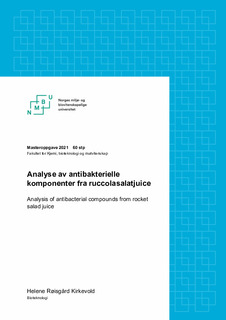| dc.contributor.advisor | Fagerlund, Annette | |
| dc.contributor.advisor | Møretrø, Trond | |
| dc.contributor.advisor | Wubseth, Sileshi Gizachew | |
| dc.contributor.advisor | Diep, Bao Dung | |
| dc.contributor.author | Kirkevold, Helene Røisgård | |
| dc.date.accessioned | 2021-10-28T12:46:46Z | |
| dc.date.available | 2021-10-28T12:46:46Z | |
| dc.date.issued | 2021 | |
| dc.identifier.uri | https://hdl.handle.net/11250/2826332 | |
| dc.description.abstract | Listeria monocytogenes er en matbåren patogen bakterie som utgjør en stor utfordring for næringsmiddelindustrien, og det søkes stadig etter nye metoder for å unngå forekomst av bakterien i produksjonsmiljø og matvarer. Spiseklare produkter med ferske, vegetabilske råvarer utgjør en ekstra risiko når det gjelder forekomst av patogene mikroorganismer. Det er viktig med ny kunnskap om faktorer som kan påvirke forekomsten av L. monocytogenes og andre patogene bakterier i slike produkter. Prøvetaking av produksjonsmiljøet i en salatfabrikk i en tidligere studie viste ingen forekomst av L. monocytogenes, og førte videre til oppdagelse av en interessant antibakteriell aktivitet mot L. monocytogenes i ruccolasalatjuice (Fagerlund et al. 2021, PLoS ONE 16:e0250648). Hensikten med denne studien var å videre undersøke den antibakterielle aktiviteten i ruccolajuice mot L. monocytogenes og andre bakteriestammer assosiert med vegetabilier, samt å isolere og identifisere de bioaktive komponentene.
Tillaging av ruccolasalatjuice for bruk i arbeidet med oppgaven ble utført. Ruccolajuicen ble frysetørket, og ekstrahert med fem ulike ekstraksjonsmiddel. Revers fase HPLC ble brukt for å separere ruccolaekstraktet i åtte fraksjoner, og fraksjonene som viste bioaktivitet ble analysert i LC-MS/MS for å identifisere de kjemiske bestanddelene. Den hemmende aktiviteten i juice, ekstrakter og fraksjoner fra ruccola ble undersøkt med mikrobiologiske vekstforsøk, ved måling av absorbans og utplating. Fluorescensmikroskopi og utplating ble brukt for å undersøke den bakteriedrepende aktiviteten.
Resultatene viste at ruccolajuice hadde en antibakteriell effekt mot L. monocytogenes, i overensstemmelse med funn fra tidligere studie. Ruccolaekstrakt ekstrahert med 100 % metanol hadde høyere veksthemmende antibakteriell aktivitet enn andre ekstrakter mot L. monocytogenes. To av de totalt åtte HPLC fraksjonene isolert fra ruccolaekstrakt viste anti- Listeria aktivitet, og besto av aminosyrer, nukleosider, en nukleobase og den kvartære ammoniumsforbindelsen kolin. Både ruccolaekstrakt og bioaktive HPLC fraksjoner viste bakteriedrepende aktivitet mot L. monocytogenes. De to bioaktive HPLC fraksjonene hemmet også veksten av ni bakteriestammer assosiert med vegetabilier, mens tre av bakteriestammene ikke ble hemmet.
Resultatene indikerer at komponenter fra ruccolasalatjuice har en in vitro antibakteriell aktivitet mot L. monocytogenes og andre bakteriestammer assosiert med vegetabilier.
Komponenter i fraksjoner fra ruccola som viste bioaktivitet ble identifisert, men videre undersøkelser kreves for å finne ut om det er disse komponentene som forårsaker den antibakterielle aktiviteten. Videre arbeid er nødvendig for å undersøke den molekylære mekanismen bak aktiviteten og for å etablere potensielle bruksområder i næringsmiddelindustrien. | en_US |
| dc.description.abstract | Listeria monocytogenes is a foodborne pathogenic bacterium that poses a major challenge to the food industry, and new methods are constantly being sought to avoid the occurrence of the bacterium in processing facilities and food products. Ready-to-eat products with fresh ingredients from vegetables pose an additional risk of contamination with pathogenic microorganisms. It is important to gain new knowledge about factors that may affect the presence of L. monocytogenes and other pathogenic bacteria in fresh produce. Sampling of a fresh produce processing facility in a previous study failed to detect L. monocytogenes, and led to the discovery of an interesting antibacterial activity against L. monocytogenes in rocket salad juice (Fagerlund et al. 2021, PLoS ONE 16: e0250648). The purpose of this study was to further investigate the antibacterial activity of rocket salad juice against L. monocytogenes and other bacterial strains associated with vegetables, as well as to isolate and identify the bioactive components.
Preparation of rocket salad juice for use in the current study was performed. The rocket salad juice was lyophilized and extracted with five different extractants. Reverse phase HPLC was used to separate the rocket juice extract into eight fractions, and the fractions showing bioactivity were analyzed with LC-MS/MS to identify chemical constituents. The inhibitory activity in rocket salad juice, extracts and fractions was investigated by microbiological growth experiments by measuring absorbance and agar plating methods. Fluorescence microscopy and agar plating methods were used to examine the bactericidal activity.
The results showed that rocket salad juice had an antibacterial effect against L. monocytogenes, in accordance with findings from the previous study. Rocket salad extract extracted with 100% methanol had higher growth inhibitory antibacterial activity than other extracts against L. monocytogenes. Two of the total number of eight HPLC fractions isolated from rocket juice extract showed anti-Listeria activity, and consisted of amino acids, nucleosides, a nucleobase and the quaternary ammonium compound choline. Both rocket juice extract and bioactive HPLC fractions showed bactericidal activity against L. monocytogenes. The two bioactive HPLC fractions also inhibited the growth of nine bacterial strains associated with vegetables, while three of the bacterial strains were not inhibited.
The results indicate that components of rocket salad juice have an in vitro antibacterial activity against L. monocytogenes and other bacterial strains associated with vegetables. Components in rocket fractions that showed bioactivity were identified, but further investigations are required to determine if these components are responsible for the antibacterial activity. Further work is needed to investigate the molecular mechanism behind the activity and to establish potential uses in the food industry. | en_US |
| dc.language.iso | nob | en_US |
| dc.publisher | Norwegian University of Life Sciences, Ås | en_US |
| dc.rights | Attribution-NonCommercial-NoDerivatives 4.0 Internasjonal | * |
| dc.rights.uri | http://creativecommons.org/licenses/by-nc-nd/4.0/deed.no | * |
| dc.title | Analyse av antibakterielle komponenter fra ruccolasalatjuice | en_US |
| dc.title.alternative | Analysis of antibacterial compounds from rocket salad juice | en_US |
| dc.type | Master thesis | en_US |
| dc.description.localcode | M-BIOTEK | en_US |

